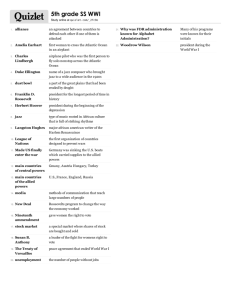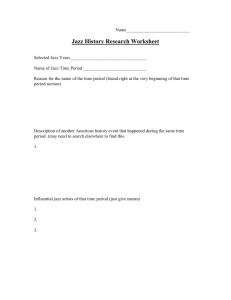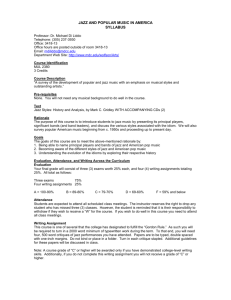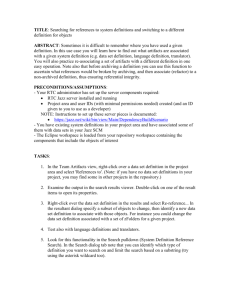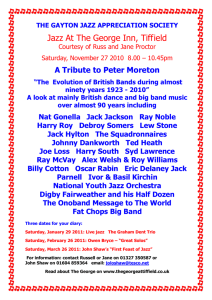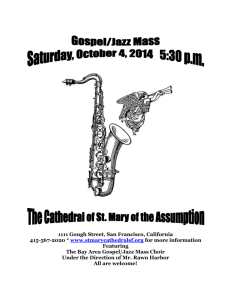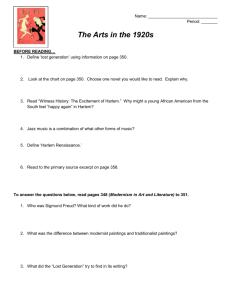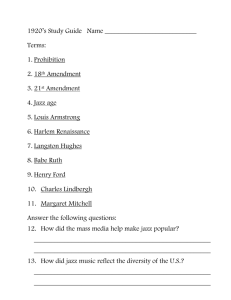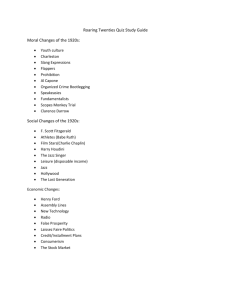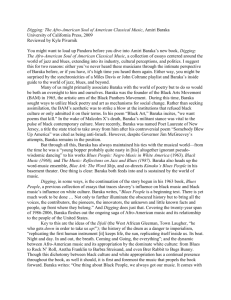Listening - Ethnic Studies Department
advertisement
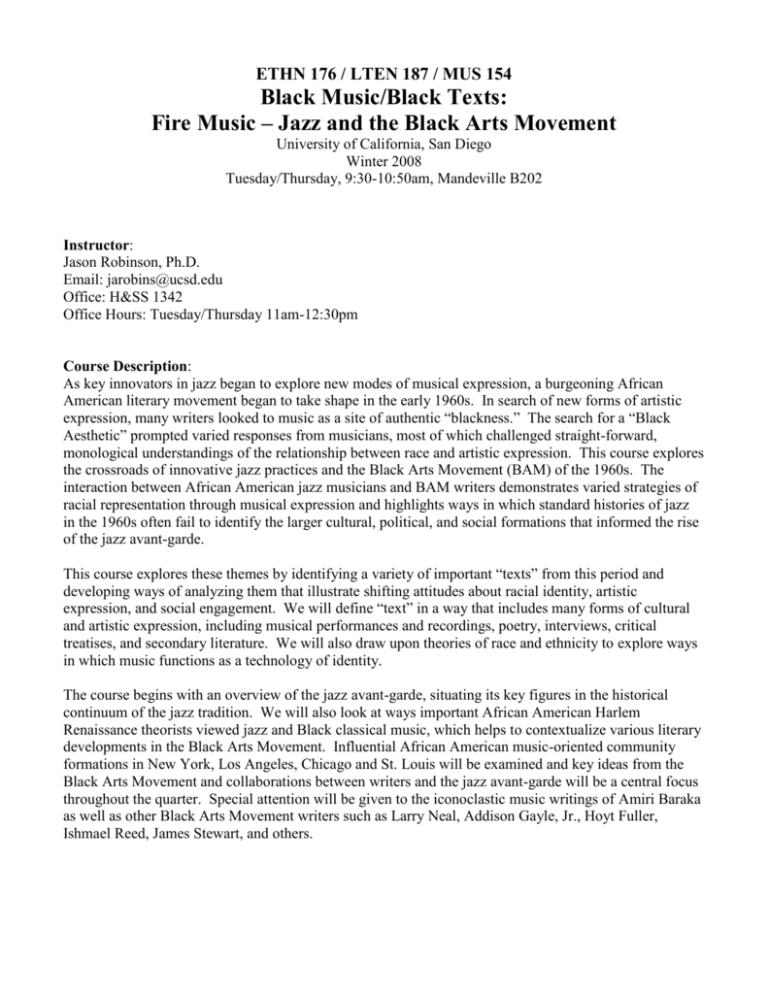
ETHN 176 / LTEN 187 / MUS 154 Black Music/Black Texts: Fire Music – Jazz and the Black Arts Movement University of California, San Diego Winter 2008 Tuesday/Thursday, 9:30-10:50am, Mandeville B202 Instructor: Jason Robinson, Ph.D. Email: jarobins@ucsd.edu Office: H&SS 1342 Office Hours: Tuesday/Thursday 11am-12:30pm Course Description: As key innovators in jazz began to explore new modes of musical expression, a burgeoning African American literary movement began to take shape in the early 1960s. In search of new forms of artistic expression, many writers looked to music as a site of authentic “blackness.” The search for a “Black Aesthetic” prompted varied responses from musicians, most of which challenged straight-forward, monological understandings of the relationship between race and artistic expression. This course explores the crossroads of innovative jazz practices and the Black Arts Movement (BAM) of the 1960s. The interaction between African American jazz musicians and BAM writers demonstrates varied strategies of racial representation through musical expression and highlights ways in which standard histories of jazz in the 1960s often fail to identify the larger cultural, political, and social formations that informed the rise of the jazz avant-garde. This course explores these themes by identifying a variety of important “texts” from this period and developing ways of analyzing them that illustrate shifting attitudes about racial identity, artistic expression, and social engagement. We will define “text” in a way that includes many forms of cultural and artistic expression, including musical performances and recordings, poetry, interviews, critical treatises, and secondary literature. We will also draw upon theories of race and ethnicity to explore ways in which music functions as a technology of identity. The course begins with an overview of the jazz avant-garde, situating its key figures in the historical continuum of the jazz tradition. We will also look at ways important African American Harlem Renaissance theorists viewed jazz and Black classical music, which helps to contextualize various literary developments in the Black Arts Movement. Influential African American music-oriented community formations in New York, Los Angeles, Chicago and St. Louis will be examined and key ideas from the Black Arts Movement and collaborations between writers and the jazz avant-garde will be a central focus throughout the quarter. Special attention will be given to the iconoclastic music writings of Amiri Baraka as well as other Black Arts Movement writers such as Larry Neal, Addison Gayle, Jr., Hoyt Fuller, Ishmael Reed, James Stewart, and others. Materials: Texts: REQUIRED: 1) LeRoi Jones (Amiri Baraka) – Blues People: Negro Music in White America This historic 1963 text details many of Baraka’s ideas about the relationship between Black music and African American culture. It will serve as a point of reference throughout the course. This book is available at Groundwork Books (452-9625). 2) Course Reader These readings cover a wide spectrum of sources, including musician interviews, scholarly essays, and key texts of the Black Arts Movement. The Course Reader will be made available online through UCSD’s Dokutek E-Reserves. You do not need to purchase a Course Reader. Additional suggested text: 3) LeRoi Jones (Amiri Baraka) – Black Music Originally published in 1968, Black Music brings together a variety of Baraka’s writings on music, including “Jazz and the White Critic” and “The Changing Same (R&B and the New Black Music),” two of his most poignant articles. Many of these articles were originally published in music magazines like Downbeat and Metronome in the mid-1960s. Because this book has limited availability, the required reading stemming from it will be included in the Course Reader. Contact Groundwork Books (452-9625) for information on ordering the book. Listening: Listening occupies a central role in this class. We will interpret recorded sound as a “text” capable of detailed critical analysis relating to a wide variety of theoretical, social, and cultural issues. Important listening examples are available online through DAR (Digital Audio Reserves), accessible through UCSD’s Dokutek E-Reserves. You are expected to engage the listening as a form of homework. Videos: A select group of video examples from lectures and a series of videos relating to the writing assignments have been placed on reserve. These items are available for viewing at Film and Video Reserves, on the first floor of Geisel Library. Grade breakdown: 3 Writing Assignments Midterm Exam Paper Final Exam Grading Scale: 97-100 A+ 94-96 A 90-93 A- 30% 25% 20% 25% 87-89 84-86 80-83 B+ B B- 77-79 74-76 70-73 C+ C C- 67-69 64-66 60-63 0-59 D+ D DF Attendance and participation: Attendance and completion of reading and listening assignments are fundamental aspects of the learning process. It is expected that you come to class prepared to discuss the readings. There will be no make-up allowed for exams, essays, or other assigned work. If you foresee a scheduling issue with the tests or assignment due dates, please contact me and we will work things out (in advance). If you miss a lecture, it is best to come to my office hours to learn about the material you missed (rather than requesting information over email). Paper: You are required to write a 5-8 page essay using the analytical tools developed through lectures, readings, and listening. The paper prompt will be distributed during week 2. The essay must be written in clear, grammatical English, typed and double-spaced (no larger than 12 point Times New Roman font, or equivalent), and must include citations and a bibliography. Due Thursday March 6. Writing assignments: There are three short writing assignments. Each assignment should be approximately 2-4 pages in length and will address specific questions related to course material. You will receive an assignment prompt in the week prior to each assignment due date. Midterm and final exams: The midterm and final will consist of short answer and essay questions – there will also be a listening component on each exam. These exams are intended to determine your depth of critical engagement with the concepts, personalities, readings, and recordings discussed in class and homework. Positive learning environment and academic integrity: This course embraces UCSD’s Principles of Community (http://www-vcba.ucsd.edu/principles.htm). We will encourage the discussion and understanding of a multitude of analytical, social, cultural, ethnic, and religious viewpoints. We will strive to foster a productive and respectful learning environment for the expression of these differences and the achievement of our educational goals. You are also required to adhere to all university policies governing academic integrity, including plagiarism and cheating. With written coursework, plagiarism can be a major challenge. Make sure to cite your sources (even if you are paraphrasing in your own words). You may want to review UCSD’s Policy on Integrity of Scholarship (http://www-senate.ucsd.edu/manual/appendices/app2.htm). Class Schedule: Jan 7-13 Fire Music: jazz, racial identity, and the concept of the “musical text” Readings: Amiri Baraka [LeRoi Jones]. Blues People. Chapters 1-4. Jason Robinson. “The Challenge of the Changing Same: The Jazz Avant-Garde of the 1960s, the Black Aesthetic and the Black Arts Movement.” George E. Lewis. Improvised Music Since 1950: Afrological and Eurological Perspectives Larry Neal. "The Black Arts Movement." Larry Neal. “Black Boogaloo.” Listening: “Introduction” Movie: Ethnic Notions Jan 14-20 The emergence of the jazz avant-garde: Cecil Taylor, John Coltrane, and Ornette Coleman Writing Assignment 1 due Thursday January 17 Readings: Amiri Baraka. Blues People. Chapters 5-9. Robert Levin. “The Jazz Composers Guild: An Assertion of Dignity.” Dan Morgenstern and Martin Williams. “The October Revolution: Two Views of the Avant Garde in Action.” John Litweiler. Ornette Coleman: A Harmolodic Life. Chapter 3. David G. Such. “The Founders of Out Jazz and Their Successors.” Listening: “Avant-garde 1” Jan 21-27 A critical shift (1): racial uplift, the Harlem Renaissance, and Black classical music Readings: Amiri Baraka. Blues People. Chapters 10-12. Rae Linda Brown. “William Grant Still, Florence Price and William Dawson: Echoes of the Harlem Renaissance.” Langston Hughes. “The Negro Artist and the Racial Mountain.” Alain Locke. “The Negro and His Music.” William Grant Still. “An Afro-American Composer’s Viewpoint.” Listening: “Harlem Renaissance” Jan 28 -Feb 3 A critical shift (2): The Black Aesthetic and racial representation through the jazz avant-garde Readings: Houston A. Baker, Jr. “Generational Shifts and the Recent Criticism of Afro-American Literature.” Amiri Baraka. Black Music. “The Changing Same (R&B and the New Black Music)” Amiri Baraka. Black Music. “Jazz and the White Critic.” Hoyt Fuller. "Towards a Black Aesthetic.” bell hooks. “An Aesthetics of Blackness: Strange and Oppositional.” Listening: “Avant-garde 2” Feb 4-10 Afro-futurism, Sun Ra, and counter-narratives to “blackness” Writing Assignment 2 due Thursday February 7 Readings: Mark Dery. “Black to the Future” Kodwo Eshun. “Motion Capture [Interview]” Kodwo Eshun. “[Dialogues Concerning] New World System Builders: Sun Ra” John Szwed. Space is the Place: The Lives and Times of Sun Ra. Chapter 3. J.C. Thomas. "Sun Ra’s Space Probe." Listening: “Collaborations” Movie: Sun Ra: Space is the Place Feb 11-17 Amiri Baraka collaborates: Black Mass and Black Dada Nihilismus MIDTERM EXAM on Tuesday February 12 Readings: Amiri Baraka. A Black Mass. Melani McAlister. “One Black Allah: The Middle East in the Cultural Politics of African American Liberation, 1955-1970.” Listening: “Collaborations” Feb 18-24 The Coltrane poem: racial representation through literary musicality Readings: Kimberly W. Benston. “Innovating Blackness: Praxis and Passion in (Late) Coltrane.” Sascha Feinstein. “From `Alabama' to A Love Supreme: the evolution of the John Coltrane poem.” Michael Harper. “Dear John, Dear Coltrane.” Collection of various Coltrane poems. Listening: “Coltrane” Feb 25-Mar 2 Challenging orthodox views of jazz and race: spiritualism and nationalism as artistic strategies Writing Assignment 3 due Thursday February 28 Readings: Brooks Johnson. "Racism in Jazz." Don Ellis. "The Avant-garde is Not Avant-garde!" Amiri Baraka. Black Music. “New Tenor Archie Shepp Talking.” Ornette Coleman. "To Whom It May Concern." John Coltrane and Don DeMichael. "Coltrane on Coltrane." Bill Coss. "Cecil Taylor’s Struggle For Existence: Portrait of the Artist as a Coil Spring." Don DeMichael. "John Coltrane and Eric Dolphy Answer the Jazz Critics." Larry Neal. “A Conversation with Archie Shepp.” Nat Hentoff. “The Truth Comes Marching In: An Interview with Albert & Don Ayler.” Listening: “Avant-garde 3” Movies: Ken Burns’ Jazz, episode 10, “Imaginary Concerts”; Inside Out in the Open Mar 3-9 Experimentalism, race, and community empowerment (1): New York and Chicago Paper due Thursday March 6 Readings: James Edward Smethurst. “Artists Imagine the Nation, the Nation Imagines Art.” Muhal Richard Abrams and John Shenoy Jackson. “The Association for The Advancement of Creative Musicians.” Ronald Radano. “Jazzin’ the Classics: the AACM’s Challenge to Mainstream Aesthetics.” George Lipsitz. “Like a Weed in a Vacant Lot: The Black Artists Group in St. Louis.” Ben Looker. “’Poets of Action’: The St. Louis Black Artists’ Group, 1968-1972.” Listening: “Community” Mar 10-16 Experimentalism, race, and community empowerment (2): St. Louis, Los Angeles, and beyond Readings: Eric Porter. “Institutionalizing Aesthetic Activism.” Horace Tapscott. Songs of the Unsung. Chapters 11-12. James Edward Smethurst. “Bandung World.” Fred Ho. “Tribute to the Black Arts Movement: Personal and Political Impact and Analysis.” Listening: “Community” FINAL EXAM – Tuesday March 18, 8-11am
